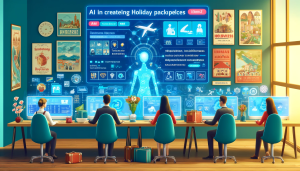 UseCasesFor.ai
UseCasesFor.ai
Choose Topic
 UseCasesFor.ai
UseCasesFor.ai
AI Use Cases
A collection of over 250 uses for artificial intelligence
A continually updated list exploring how different types of AI are used across various industries and AI disciplines,including generative AI use cases, banking AI use cases, AI use cases in healthcare, AI use cases in government, AI use cases in insurance, and more

Sign up
to receive a PDF containing all the use cases and stay updated with the latest AI trends and news (you can always unsubscribe)
Personalised holidays

Introduction
In this paper, I will be defining and describing the concept of Artificial Intelligence (AI), its importance, the different types of AI, and the various applications of AI in the workplace and at home. Furthermore, I will be exploring the ethical considerations and challenges related to AI, as well as the potential impacts of AI on individuals, organizations, and society as a whole. Additionally, I will discuss the future trends and developments in AI that are worth monitoring.
Challenges
The application of NLP AI in the context of tailor-made holidays raises several concerns. The fact that human language is full of complexities such as culture, dialects and slangs makes it difficult to understand and translate language accurately. This creates challenges in understanding the customer’s requests and providing accurate translations. Thirdly, there is a challenge in managing huge amounts of unstructured data such as customer reviews and travel blogs in the tourism industry to process and extract useful information. Fourthly, there are issues of privacy since NLP AI needs certain data about individuals to provide personalized services. Finally, there is a challenge in incorporating AI into current systems given the fact that most organizations in the tourism sector are still embracing outdated technologies.
AI Solutions
There are, however, some difficulties that can be encountered. It is able to unmask and process customer complaints and comments as well as comments from online reviewers which will enable businesses to know the customers’ preferences and mood. It also offers real-time translation services, which can help to overcome language limitations and improve the interaction with the customers. There are also chatbots, which are developed using NLP AI, to attend to the customers’ needs and requests at all times, and in the most appropriate way by offering personalized holiday packages. Furthermore, there are other AI solutions such as IBM Watson that can assist organisations in implementing AI without having to struggle through the integration process.
Benefits
The benefits of using NLP AI in personalised holidays are numerous. It enhances customer experience by providing personalised services and real-time assistance. It simplifies the process of holiday planning for customers, saving their time and effort. For businesses, it provides valuable insights into customer behaviour and preferences, aiding in decision making and strategy planning. It improves operational efficiency by automating routine tasks and reduces costs by minimizing the need for human intervention. Furthermore, it helps businesses stay competitive in the rapidly evolving tourism industry.
Return on Investment
It is possible to realize a high ROI when applying NLP AI in the context of personalised holidays. For example, a study by Accenture reveals that AI has the potential of boosting profitability in the travel industry to 38% by 2035. Improving efficiency in operations, enhancing the customers’ experience, and increasing their loyalty, as well as enabling data-based decisions are the key factors that provide high ROI. Nevertheless, the ROI would vary depending on the scope of the implementation, the degree of AI adoption, and particular application.